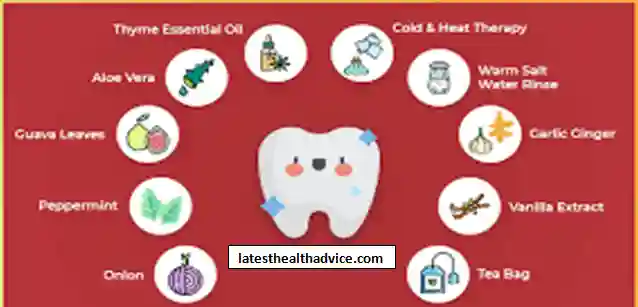In this blog post, we will look at the best Natural Remedies for Tooth Infection, as well as its pros and cons. In addition, we will make sure you understand that, while helpful, they are only a temporary solution to a significant problem.
A stabbing toothache has the power to ward off a cold. Either unexpectedly in the middle of the night or during a busy day, the pain can become unbearable. Although visiting the dentist should always be your first choice, there are times when you need help right away. Fortunately, we have Natural Remedies for Tooth Infection available to help ease the pain associated with dental infections until you get the care you need.
What is a dental infection?
The innermost part of your tooth, the pulp, is where bacteria can enter and cause a dental infection, sometimes called a dental abscess. This can be caused by: gum disease; dental caries
Broken or fractured tooth
The bacteria cause an infection that results in a pus-filled abscess. This painful condition does not go away on its own and if left untreated, it can spread to other parts of the body and cause serious health problems.
Signs that you have a tooth infection:
Sensitivity to hot or cold foods and drinks; throbbing pain that worsens at night or when lying down; Swollen gums or a noticeable lump near the infected tooth
- Fever or general feeling of illness
- Lymph nodes in the neck or jaw that are swollen
The importance of professional dental care
It is important to emphasize that natural remedies should not replace professional medical care when trying them. A dentist can determine the extent of your infection and treat you with antibiotics, root canal therapy, or, in extreme cases, tooth extraction. Although natural remedies can provide short-term relief, they are unable to eliminate the infection.
Now that we’ve covered that, let’s explore the best natural remedies to relieve the pain and discomfort of dental infections.
Natural Remedies for Tooth Infection
Clove oil: A natural numbing agent
Because clove oil has strong anesthetic and antibacterial properties, it has been used to treat toothaches for centuries. A substance called eugenol present in it fights bacteria and works as a natural pain reliever.
How to use:
- To prevent gum irritation, dilute a few drops of clove oil with a carrier oil such as coconut oil.
- Soak a cotton ball in the mixture and apply it directly to the affected tooth for about ten minutes.
- For temporary relief, repeat this process two to three times a day.
Attention:
- Clove oil should not be used directly on the gums as it can cause irritation and a burning sensation.
Garlic: A natural antibiotic
Studies show that garlic, known for its antibacterial properties, can help fight bacteria in the mouth. Garlic is still a widely used home remedy for toothache, although research on the subject is still ongoing.
How to use:
- Crush a fresh clove of garlic, lightly salt it and apply the mixture to the diseased tooth.
- After a few minutes, remove it with water and wash your face.
Warning:
If garlic causes mouth irritation, stop using it immediately as it may irritate.
Salt water rinse: Simple and effective
The easiest and best natural way to treat an infected tooth is gargling with salt water. Salt helps with healing, killing bacteria and reducing inflammation.
How to use it:
- To dissolve salt, stir half a teaspoon in a cup of hot water.
- After 30 seconds of rinsing around the mouth, spit out the solution.
- Do this two to three times a day, especially after meals.
Why it works: Salt helps remove excess fluid from the affected area and reduces swelling. It also removes microorganisms from the gums and teeth.

Turmeric: Golden spice with anti-inflammatory effects
The often touted anti-inflammatory and antibacterial properties of turmeric can help treat dental infections.
How to Use It:
- To make a paste, mix a little water in one tablespoon of turmeric powder.
- After applying the paste to the affected area, leave it on for ten to fifteen minutes and then wash it off.
bonus tip
You can also add a small amount of honey or salt to the turmeric paste for additional benefits.
Strong antiseptic Tea Tree Oil
Tea tree oil is another option to get relief from the infection as it is a powerful natural antiseptic with strong antibacterial properties.
How to use it:
- Use a carrier oil such as olive oil to dilute 1-2 drops of tea tree oil.
- Using a cotton swab, apply the solution to the affected region. Keep it out of the mouth as consuming tea tree oil can be harmful.
Cold compress: soothes pain
A cold compress can help relieve discomfort and reduce swelling, but it won’t prevent infection.
How to use:
- Apply an ice pack or a bag of frozen peas wrapped in a cloth to the cheek next to the infected tooth.
- Use it for 15 to 20 minutes, taking breaks between applications.
Hydrogen peroxide rinse: For extra cleaning
Rinsing with hydrogen peroxide can reduce gum irritation and remove oral bacteria.
How to apply it:
- Combine equal parts water and 3 percent hydrogen peroxide.
- After 30 seconds of rinsing around the mouth, spit out the solution.
- Then wash with clean water to avoid irritation.
Comment:
- Use hydrogen peroxide with care. Avoid swallowing and do not use more than once a day to avoid irritation.
Disadvantages of Natural Remedies for Tooth Infection
These home remedies for toothache have some limitations, although they may provide immediate relief:
- What works for one person may not work for another; Natural remedies can relieve the symptoms, but they will not cure the bacterial disease. There are variables such as the severity of the infection and each person’s body chemistry.
- If you only use alternative treatments, you risk delaying medical care and worsening the infection.
In short, natural remedies for tooth infections can help you delay healing, but they cannot replace a visit to the dentist.
More tips for managing a toothache
- Pain and swelling can be relieved with medicines such as ibuprofen. Pay close attention to the dosage instructions.
- Floss frequently and brush twice a day to prevent bacteria.
- Sugar is a food source for bacteria that can make infections worse. Limit your diet to soft, bland foods that are easy to chew.
when to go to the dentist
If you have severe symptoms such as:
- swelling of the face or jaw
- fever
- difficulty breathing or swallowing
Don’t wait.
These are signs that the infection has spread and you should seek help immediately. While natural remedies can help manage discomfort, they cannot replace the knowledge of a dentist.
conclusion
A tooth infection is a serious condition, and while the natural world offers valuable resources to ease discomfort and inflammation, it’s important to remember that these are only temporary measures. If you have a tooth infection, use these home remedies to relieve the pain, but be sure to schedule an appointment with your dentist to address the underlying problem. When you smile, it’s worth it!

